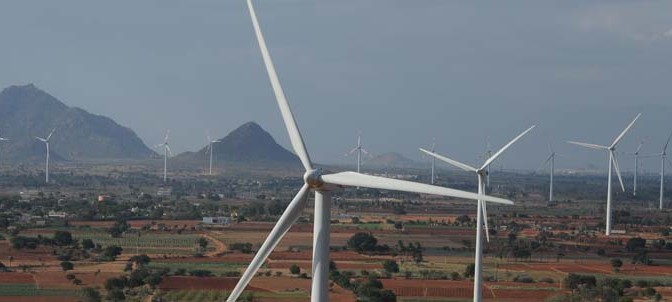Upon the announcement of bringing back the ‘generation-based incentive’ scheme, for which the Budget has allocated Rs 800 crore, the wind power sector heaves a sigh of relief.
The GBI, removed from April 1, 2012, has been the demand of the industry. The incentive is basically a grant from the government per kilowatt-hour of electricity generated by the wind turbines and is expected to be 50 paise per unit.
For some months now, the wind power sector has been eagerly waiting for some announcement about the GBI, either in the Budget or otherwise. India added 1,199 MW of wind power capacity in the April-January period, compared with 3,200 MW in the whole of the previous year.
What was holding back investments was the uncertainty over two key incentives—GBI and ‘accelerated depreciation.’ An investor could avail himself of only one of the two.
“It is a big relief to the industry,” Ramesh Kymal, Chairman and Managing Director, Gamesa India, and Chairman, Indian Wind Turbine Manufacturers’ Association, said at a CII-Budget viewing session here today.
Now the contours of the new GBI scheme will be eagerly awaited by the industry. How much will be the incentive? In the previous scheme, it was 50 paise per unit. Will be there be a per MW of capacity cap on the amount of incentive? In the previous scheme, the government the cap was Rs 62 lakh per MW. More importantly, whether the new scheme will be retrospectively, that is, with effect from April 1, 2012? This is important because if it is not, then such of those who invested into putting up wind turbines in the current year will be out of the scheme.
The wind industry is also enthused about the promise by the Finance Minister of “low interest bearing funds” from the National Clean Energy Fund, routed through the Indian Renewable Energy Development Agency, a non-banking finance company under the Ministry of New and Renewable Energy.
The Finance Minister said in his Budget speech today: “Clean and Green energy is a priority of the Government. However, despite cost advantages in labour, land and construction, the consumer pays a high price for renewable energy. One of the reasons is high cost of finance. In order to provide low cost finance, Government will provide low interest bearing funds from the National Clean Energy Fund (NCEF) to IREDA to on-lend to viable renewable energy projects. The scheme will have a life span of five years.”
http://www.thehindubusinessline.com/

